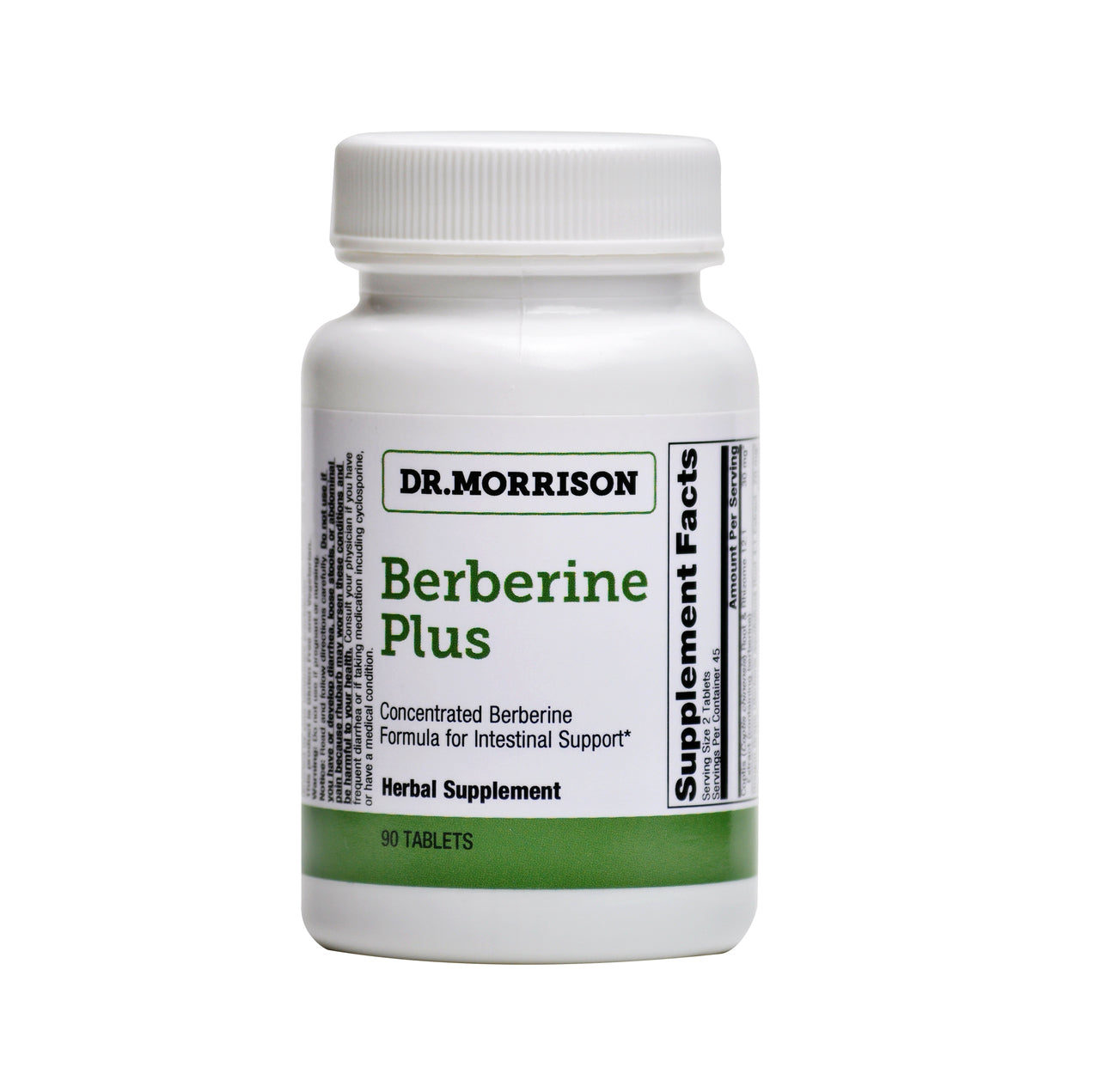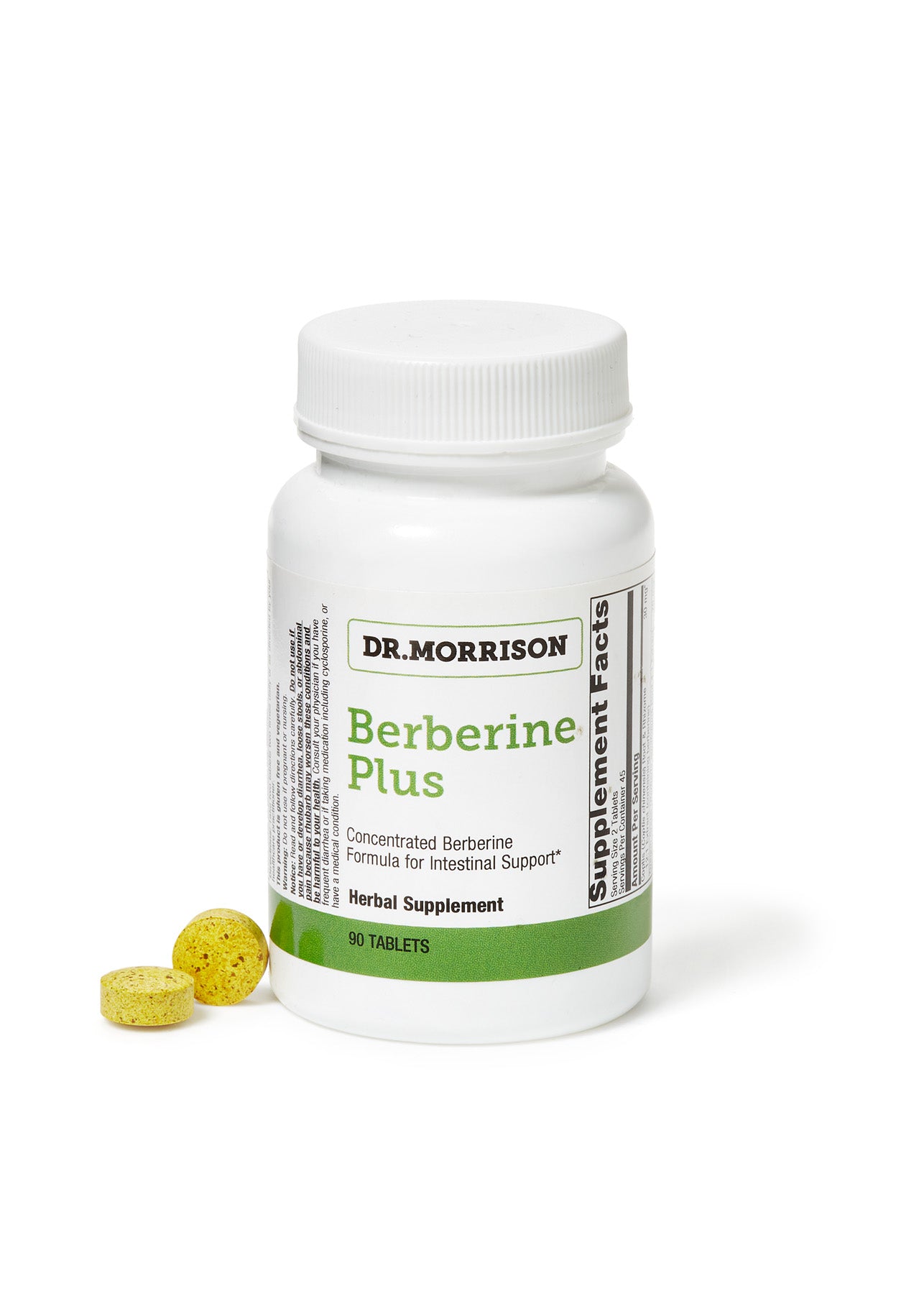Berberine Plus
$ 52.00
Size: 90 Tablets
Potent Bitter Herb Formula for Healthy Digestion, Microbiome Balance, and Intestinal Healing*
Please select all options.
The importance of a healthy digestive tract is increasingly recognized as fundamental to overall health and quality of life. This means not only effectively digesting and absorbing the nutrition we need from our food, but also nourishing a balanced gut microbiome. The trillions of microbes that live in our intestines impact numerous aspects of our health, far beyond the gut!
Bitter herbs, like the powerful alkaloid berberine, have been used for thousands of years to restore digestive function. With the many factors that impact gut health today—such as diet, toxins, infections, and stress—we need the support of bitter herbs more than ever. The specialized herbal formula in Berberine Plus harnesses the power of the gut microbiome to support healthy digestion, gut healing, and a robust metabolism.
Highlights:
- Supports Balanced Gut Flora to Help Reduce Gas and Bloating*
- Specifically Targets Undesirable Microbes*
- Found in Research to Reduce Small Intestinal Bacterial Overgrowth (SIBO)*[1]
- Promotes Optimal Digestion for Increased Nutrient Absorption*
- Supports Healthy Immunity and Detoxification*
- Promotes Healthy Cholesterol and Triglyceride Levels Within the Normal Range*[2]
- Supports Healthy Metabolism, Insulin Sensitivity, and Blood Sugar Levels*[3-4]
*These statements have not been evaluated by the FDA and are not intended to treat or cure any disease.
In our experience, Berberine Plus is a uniquely powerful tool for resetting gut function and metabolism. The herbs in Berberine Plus are expertly balanced with warming and cooling elements for comprehensive support.
Berberine Plus is unique in providing whole-herb extracts of traditional berberine-rich herbs—Coptis, Oregon Grape, and Phellodendron—alongside concentrated, bioactive berberine hydrochloride for the synergistic benefits of full-spectrum plant compounds.
Berberine has many amazing systemic benefits beyond the digestive tract, including:
- Antitumor Properties*[5-6]
- Potent Anti-Inflammatory*[7]
- May Help Protect the Liver*[8]
- Helps to Regulate Hormones*[9]
The bitter, cooling herbs Chinese Skullcap and Chinese Rhubarb are added to tone and strengthen the digestive tract, balanced with warming and anti-inflammatory Ginger and Chinese Licorice to support digestion and intestinal healing.
2 TABLETS PER SERVING
- Berberine HCI (Berberine from Phellodendron amurense bark extract) 400 mg
- A 4:1 (equivalent to 1,200 mg raw, dried, unprocessed herbs) proprietary extract of:
Coptis (Coptis chinensis) Root & Rhizome
Chinese Skullcap (Scutellaria baicalensis) Root
Phellodendron (Phellodendron chinense) Bark
Ginger (Zingiber officinale) Rhizome
Chinese Licorice (Glycyrrhiza uralensis) Root
Chinese Rhubarb (Rheum officinale) Root & Rhizome 300 mg
- Oregon Grape (Berberis aquifolium) Root 4:1 Extract 70 mg
- Coptis (Coptis chinensis) Root & Rhizome 12:1 Extract (containing berberine) 30 mg
Other Ingredients: Microcrystalline cellulose, croscarmellose sodium, silica, stearic acid (vegetable), coating (hypromellose, medium-chain triglycerides, and hydroxypropylcellulose), and magnesium stearate (vegetable)
This product is non-GMO, gluten-free, and vegetarian.
Take two tablets two times daily or as directed by your healthcare practitionerWarning: Do not use if pregnant, nursing, or taking cyclosporine.
Caution: If taking medications, including oral anti-diabetic medications, or other nutritional supplements, consult your healthcare practitioner before use.
Introduction: Berberine is a natural isoquinoline alkaloid with anti-cancer properties. Nevertheless, the underlying mechanism of its action in human colorectal cancer (CRC) has not been thoroughly elucidated. We investigated the anti-cancer effect of berberine on HT-29, SW-480 and HCT-116 human CRC cell lines.
Methods: Cell proliferation, migration and invasion were studied by MTT assay, wound healing, transwell chambers and flow cytometry. Reverse transcription-quantitative polymerase chain reaction (RT-qPCR) and immunostaining were used to evaluate the expression of aquaporins (AQPs) 1, 3 and 5 in colon cancer cell lines before and after treatment with berberine (10, 30 and 100 µM). RT-qPCR and Western blotting were used to further explore the PI3K/AKT signaling pathway and the molecular mechanisms underlying berberine-induced inhibition of cell proliferation.
Results: We demonstrated that treatment of these CRC cell lines with berberine inhibited cell proliferation, migration and invasion through induction of apoptosis and necrosis. HT-29, SW-480 and HCT-116 stained positively for AQP 1, 3 and 5, and berberine treatment down-regulated the expression of all three types of AQPs. Berberine also modulated PI3K/AKT pathway activity through up-regulating PTEN and down-regulating PI3K, AKT and p-AKT expression as well as suppressing its downstream targets, mTOR and p-mTOR at the protein level.
Discussion/Conclusions: These findings indicate that berberine inhibited growth, migration and invasion of these colon cancer cell lines via down-regulation of AQP 1, 3 and 5 expressions, up-regulating PTEN which inhibited the PI3K/AKT pathway at the gene and protein levels, and that AQP 1, 3 and 5 expression level can be used as prognostic biomarkers for colon cancer metastasis.
Efficacy of berberine in patients with type 2 diabetes mellitus
Berberine has been shown to regulate glucose and lipid metabolism in vitro and in vivo. This pilot study was to determine the efficacy and safety of berberine in the treatment of type 2 diabetes mellitus patients. In study A, 36 adults with newly diagnosed type 2 diabetes mellitus were randomly assigned to treatment with berberine or metformin (0.5 g 3 times a day) in a 3-month trial. The hypoglycemic effect of berberine was similar to that of metformin. Significant decreases in hemoglobin A1c (from 9.5%+/-0.5% to 7.5%+/-0.4%, P<.01), fasting blood glucose (from 10.6+/-0.9 mmol/L to 6.9+/-0.5 mmol/L, P<.01), postprandial blood glucose (from 19.8+/-1.7 to 11.1+/-0.9 mmol/L, P<.01), and plasma triglycerides (from 1.13+/-0.13 to 0.89+/-0.03 mmol/L, P<.05) were observed in the berberine group. In study B, 48 adults with poorly controlled type 2 diabetes mellitus were treated supplemented with berberine in a 3-month trial. Berberine acted by lowering fasting blood glucose and postprandial blood glucose from 1 week to the end of the trial. Hemoglobin A1c decreased from 8.1%+/-0.2% to 7.3%+/-0.3% (P<.001). Fasting plasma insulin and homeostasis model assessment of insulin resistance index were reduced by 28.1% and 44.7% (P<.001), respectively. Total cholesterol and low-density lipoprotein cholesterol were decreased significantly as well. During the trial, 20 (34.5%) patients experienced transient gastrointestinal adverse effects. Functional liver or kidney damages were not observed for all patients. In conclusion, this pilot study indicates that berberine is a potent oral hypoglycemic agent with beneficial effects on lipid metabolism.



